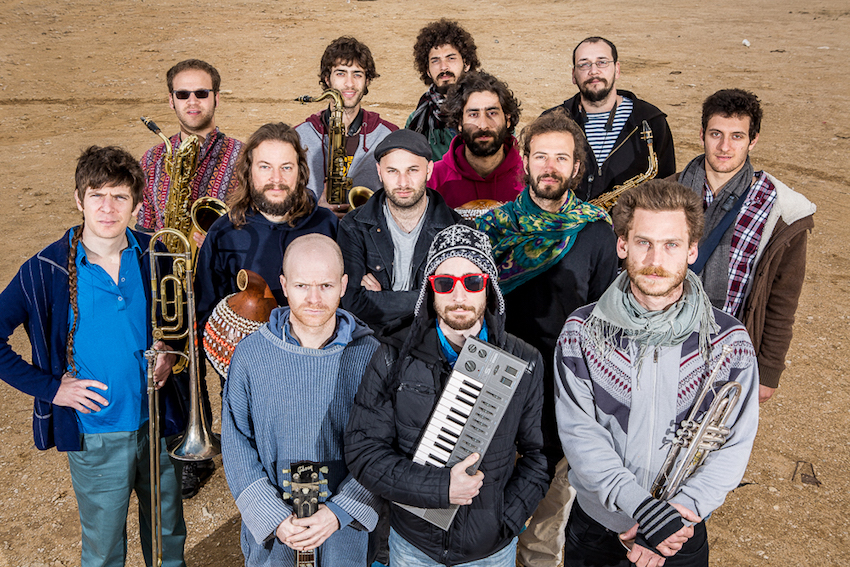12.22.17

Located in the southern Tel Aviv neighborhood of Florentin, the Hoodna bar is the headquarters of its eponymous 14-member orchestra. Formed in 2012, the Hoodna Orchestra presents a melding of African jazz and funk styles, in part influenced by their own city’s rich and dynamic ethnic makeup. We spoke to Rani Birenbaum, owner of Hoodna and percussionist in the Hoodna Orchestra, about Israel’s deceptive diversity and the path that led his band to their global sound.
In the beginning
Birenbaum’s involvement in the group began, essentially, when one of the musicians who regularly played at his bar approached him about the idea of hosting rehearsals and gigs for a new large ensemble.”[They were] focused on Afrobeat, but also just the general idea of having a big orchestra, and having a place to have rehearsals and play shows,” he recalls. “I put a special day every week for the place to open for rehearsals during the day for the band. And it developed from there.” Before long, he became a full-fledged member himself.
Incorporating Ethiopian sounds
When Hoodna formed, Birenbaum says, the focus was largely on West African funk and afrobeat. After its members participated in another project, however — a similar big-band called the Ethio Orchestra — Ethiopian sounds became a key element of their sound (and two of their latest singles). It also fit with Hoodna’s neighborhood, and the changing nature of Israel itself.
“There’s a pretty big comunity of Ethiopian Jews in Israel,” Birenbaum explains. “Ilan Smilan is kind of the music supervisor in our band, and he used to collaborate with a few Ethiopian musicians and singers, and he brought that spirit and some of the connections to this band.”
But the nature of immigration to Israel from East Africa is a bit more complicated than many other stories of migration to the country — largely because, as Birenbaum explains, many of the newcomers are not Jewish.
“The south part of Tel Aviv is pretty heavily densely populated with immigrants [and] in the south part of Tel Aviv, there is a big concentration of African people who are not Jewish. We used to have a big community of Ivory Coast and Ghana. Most of them are not here anymore, and now there are between 60 and 80,000 people from Eritrea.”
https://www.instagram.com/p/-R2uO_icgu/?taken-by=hoodnaorchestra
Eritrea, while markedly dissimilar to Ethiopia in some key respects, shares a similar cultural and musical palette. “I live in a neighborhood where at least half of the people are of Eritrean descent, so you hear this music, or you eat the food, and it’s very inspiring and interesting to experience this culture in all its forms,” Birenbaum says. “In Israel, it’s a relatively new thing that we have such big communities that are not Jewish.”
When the band set out to adopt East African modes and rhythms into their repertoire, the going wasn’t always easy. “Some of this stuff might seem simple at first but the grooves can be hard to get if you’re not accustomed to this type of music,” Birenbaum explains. Luckily, the band had a little help from another Israeli band, a three-person group called Adyabo Ensemble whose members tk and who play a more traditional brand of Ethiopian music.
Two of Hoodna Orchestra’s most recent singles feature contributions from two very talented Ethiopian musicians — the singer Tesfaye Negatu and the singer/lyricist Demisu Belete.
Birenbaum says the music of his band, and others who have taken influence from some of the African communities in Israel, “I think it was very refreshing for young Ethiopians to see so much intersted in their own original culture. That’s part of the response we’ve gotten from younger and older people in the Ethiopian community, who were very happy and proud to see such interest.
Influences and “sister bands”
Another artist Birenbaum points to on the Tel Aviv is Tigris — a band that, like Hoodna Orchestra, blends African and other international music into a distinctive blend. “They are kind of like a sister band to us,” says Birenbaum. “The way they fuse their multiple different African influences with more current modern rock and pop and surf and electronics is very inspiring. You don’t see a lot of stuff that is mixed and fused and really becomes its own thing in the way they do it.”
Birenbaum says that, on a personal level, Israeli music wasn’t a particular influence — it hung in the air, all too easy to ignore. The Arabic and Middle Eastern music that was often sold on cassettes at the Central Bus Station, however, piqued his interest.
“Arabic and Middle Eastern music influenced all of us in Israel,” Birenbaum says. “It didn’t have its own place in mainstream radio and television. It wasn’t respected, it was looked down upon. [But] in the past 10 years or so, this is the mainstrem music — the most successful music in Israel. It went on a strange path, from being something looked down upon by the mainstream, into the heart of the mainstream.”
Listen on for more from Birenbaum about his band, his influences, and the exciting state of music in contemporary Israel.
Playlist
Hoodna Orchestra and Tesfaye Negatu — Yalben
Adyabo Ensemble – Erikum instrumental music
TIGRIS – Chupchic Disco
Aris San – Blood, Blood
FARID AL’ ATRACHE Albi ou miftahou
MIX:
